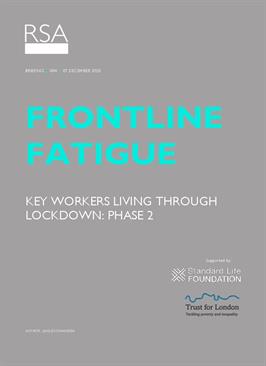Key workers living through lockdown phase 2
2020 has been the year of the key worker. But our survey finds they still feel stressed and at burn-out point. We need a ‘new deal’ to reward and support those who provide critical frontline services.
Key findings
- Half of all key workers feel it is likely they will face burnout this winter. This rises to 63% of NHS staff and 58% of social carers.
- Social care workers are finding it more difficult to take time off if unwell. 29% of care workers said that they would struggle to take time off in the event of illness.
- Social care workers are also the most likely key worker occupation to have taken a cut to their pay when they could not work due to coronavirus.
- Half of key workers, and 72% of schoolteachers, feel at high at risk of catching the virus at work.
- Many key workers are carrying out vital work while suffering from economic insecurity.
- Just 31% think the UK government is doing enough to support them, and only 35% think the same of the public, though 68% think their employer is doing well.
In response, we set out five areas that the government must address immediately in order to support key workers: full-wage sick pay for all employees, the Real Living Wage for all key workers, a pay premium, a ‘benevolent fund’ to support key worker mental health and wellbeing, and measures that can help end abuse against shop workers.
Download Frontline fatigue (pdf)
Supported by Standard Life Foundation and the Trust for London.
pdf 548.3 KB
Author

Related content
-
All clapped out? Key workers living through lockdown
Policy briefing
Key workers have kept the country going during the pandemic, but some are facing the worst of the economic turmoil created by it.
-
Digital lifelong learning in France
Report
Veronica Mrvcic Aoife O'Doherty
Read the findings of our partnership with Bayes Impact, funded by the Mastercard Center for Inclusive Growth, as we supported the design and evaluation of their Jobflix platform.
-
Good Work Guild: inspiring the future of work
Blog
Adanna Shallowe
Learn about the twelve-month journey of The Good Work Guild and the recommendations its global network of Fellows and work practitioners have made.

The Future of Work
We want to make sure that everyone, regardless of background or starting point, can pursue good work.



